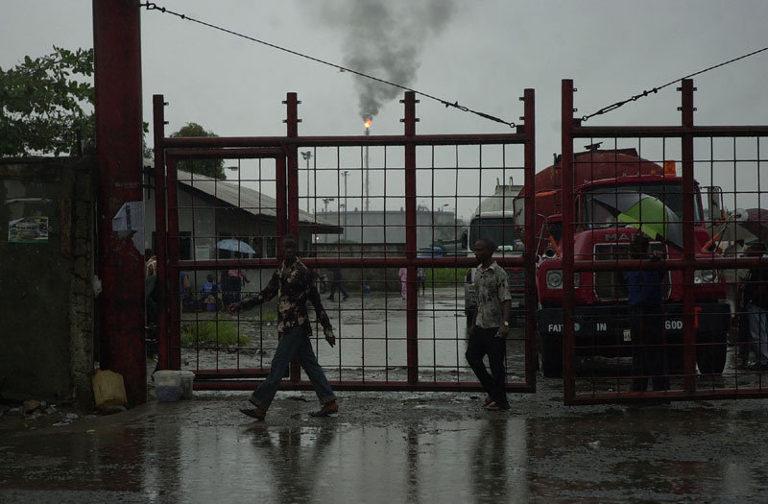The Universal Declaration of Human Rights begins: “All human beings … should act towards one another in a spirit of brotherhood.” It is now widely acknowledged that human rights cannot be enjoyed without a safe, clean and healthy environment. The right to a healthy environment is enshrined in more than 100 constitutions all over the world because human and environmental rights are intertwined.
However, despite the endorsement of the UN Guiding Principles on Business and Human Rights, oil companies exploiting irreplaceable resources in the Niger Delta are callously flouting fundamental human rights. That is the conclusion I have been forced to draw from my work as chair of the Bayelsa State Oil and Environmental Commission (BSOEC).
In numerous recent visits with my commission colleagues, I have had first-hand experience of the chronic damage being inflicted on the people of Bayelsa state and their environment. Colossal oil spillages across the land have contaminated the air they breathe, the water they drink and fish in, and the food they grow. As many as 10m gallons of oil may have been spilled over the past 50 years. That’s equivalent to an Exxon Valdez disaster, an oil tanker that ran aground off Alaska in 1989, causing one of the worst environmental disasters.
Bayelsa, in southern Nigeria, produces approximately one-third of the country’s oil wealth, but its 2 million people are some of the poorest in the country. Estimates suggest that pollution may be causing 16,000 infant deaths a year. Unique ecosystems have been destroyed, resources depleted and communities destabilised. It’s getting worse every day.
The burgeoning worldwide demand for energy, with its adverse impact on the world’s climate, is now well documented. But insufficient attention is being paid to the price paid in terms of health and welfare by the communities who live in the shadow of exploitation.
Human Rights Day offers a prime opportunity to tell the world about the Bayelsa people’s hitherto unpublicised plight. We owe it to them. The degradation of their environment is directly linked to the loss of their universal right to “a standard of living adequate to health and wellbeing … including food, clothing, housing and medical care”, asserted by article 25 of the Universal Declaration. Article 26 refers to the duties we have to the community to protect one another’s rights and freedoms.
The BSOEC has been set up to investigate the regional catastrophe in Bayelsa state and to propose solutions to end the pollution crisis and resultant human suffering. The BSOEC comprises leaders from government, NGOs, faith communities and international experts. It has collected evidence from more than 500 individuals directly affected and has visited polluted sites across the country. An interim report was published in November 2019. The full report will be published next year, with recommendations for changes to the legal, policy and regulatory framework.
Nearly 50 years ago, Dr EF Schumacher wrote the prophetic book Small Is Beautiful: A Study of Economics as if People Mattered. Among his conclusions are these spine-chilling words: “In the excitement of his scientific and technical powers, modern man has built a system of production that ravishes nature and a type of society that mutilates man.” I cannot think of a more apt description of what has been happening in Bayelsa state.
The legal system in Nigeria is cumbersome, costly and inefficient. Victims are rarely able to afford the means to justice and redress. While governments must accept a share of responsibility for this catastrophe, the onus lies largely with the multinational oil companies that dominate the scene. They drill and export the oil and gas. They own the inadequate and poorly maintained and poorly guarded infrastructure that have allowed oil spills and other forms of pollution to become systemic for people in Bayelsa.
All too often they do not respect their fundamental human rights and are getting away with a pollution footprint with global consequences, including climate change. Yet those who bear the immediate cost are the people of Bayelsa, where human life appears to be disposable in the pursuit of wealth.
Repentance, reparation and remedy for damage done for decades is long overdue. Too many people treat distant parts of the world like giant rubbish dumps. If you or I behaved like that in our locality, albeit on an infinitely smaller scale, we would be rightly prosecuted for fly-tipping.
We are all temporary tenants on this planet and will be held accountable for its management. Future generations will look at the state of their inheritance and will want to know who in the past benefited from its irresponsible exploitation and who paid the price for it. If there is still an opportunity for the present generation to make amends, we had better get on with it with the utmost urgency. Otherwise, history will judge us as planetary vandals and abusers and our subscription to the Universal Declaration of Human Rights will be mere lip-service.
Teaser photo credit: By sixoone – Wish For Africa, CC BY 2.0





